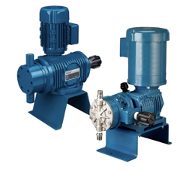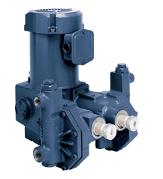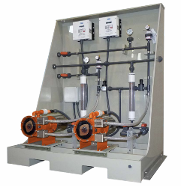Water – it’s everywhere. It’s the reason we exist and how we continue to live. It flows all around the world, being a valuable resource for people and a range of industries. As an essential part of life – either for consumption,
cleaning or industrial use – water needs to remain clean and free from impurities that can be harmful. This is why water and wastewater treatment are necessary.
Water treatment may seem simple: removing impurities and particulates from water and reusing the cleaned water or releasing it back into the environment. However, several unique challenges are present throughout the water treatment process.
Specifically, water and wastewater treatment are made up of a number of critical steps involving a variety of chemicals, each of them requiring its own pump technology for handling and dosing applications. Some common chemicals used for water treatment
include sodium hypochlorite, sulfuric acid, sodium hydroxide, sodium bisulfite and emulsion polymers. These chemicals vary in their characteristics, specifically their pH levels, viscosities, material compatibility and handling attributes. That’s
why selecting the right pump technology for each chemical and step of the water treatment process is necessary to ensure water treatment is successful.
Neptune offers the following technology designed to efficiently, reliably and safely handle the specific chemicals required in every step of the water treatment process:
Find Your Nearest Distributor
Mechanically-Actuated Diaphragm Metering Pump

Offering easy operation and start-up, suction lift capabilities and the ability to handle liquids that off-gas, such as sodium hypochlorite, mechanically-actuated diaphragm metering pumps have discharge pressure capabilities ranging from 100 to 235 psi (7 to 16 bar) max with repeatable accuracy normally about +/-2%. Because they are usually not offered
with an onboard relief valve, an external relief valve is usually required to prevent damage during over-pressurized situations. Typically, these pumps offer a lower initial cost with higher flow rates but can also have higher operating costs.

Hydraulic-Actuated Diaphragm Metering Pump
Designed for the harshest chemical-handling conditions and repeatable dosing accuracy of +/-1%, hydraulic-actuated diaphragm metering pumps are low-maintenance and are engineered for 20 years of service. These pumps have an adjustable internal relief valve that prevents over-pressurized situations from damaging
the pump. They can also operate at extremely high pressures, so long as discharge lines are not an issue.
Solenoid-Actuated (Electronic) Metering Pump
-metering-pump.png?sfvrsn=59503619_1)
Ideal for extremely low flow rates and pressures, solenoid-actuated metering pumps offer a repeatable dosing accuracy of +/-3%. These pumps are generally available at a maximum of about 20 gph (76 L/hr) with a maximum pressure of around 30 psi (2 bar), with lower and medium capacities compatible with pressures of 100 psi to
150 psi with low flows up to more than 200 psi (4 bar). Typically, these pumps are provided with an onboard relief valve to prevent damage from over-pressurization.

Peristaltic Pump
Intended for viscous and abrasive chemicals, the simple design of peristaltic pumps allows for dry-run capabilities. Because these pumps do not have any valves, there is no risk of clogging. This feature is ideal for viscous, abrasive and corrosive chemicals and liquids that can solidify or become gelatinous when resting.
Whether mechanical diaphragm metering pumps, hydraulic actuated diaphragm metering pumps, solenoid actuated (electronic) metering pumps or peristaltic pumps, Neptune provides the right pump technology for every step of the water treatment process.
Because there’s no one better suited to choose the best pump technology for specific operations than the manufacturer, Neptune can lend a hand and help operators select the right pump technology to ensure water treatment operations remain
safe, effective, reliable and operating at the highest level possible.
To learn more about selecting the right metering pump for your operation, read the whitepaper:
Choosing the Right Chemical-Metering Pump for Treatment-Plant Systems.